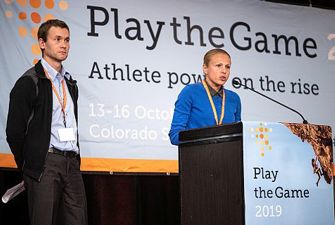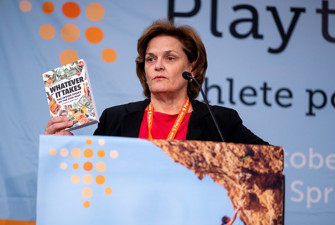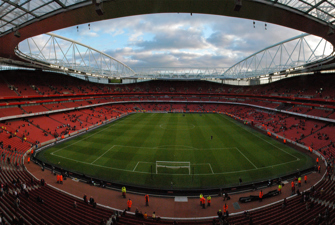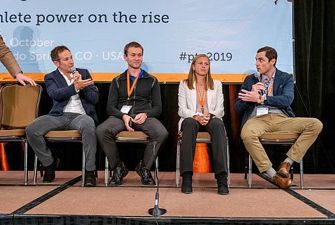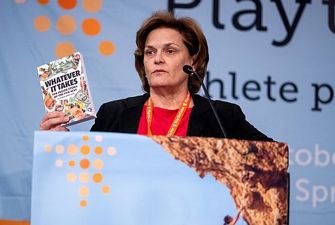Ten years of trouble for a whistleblower couple on the run from Russian retribution
Yuliya and Vitaly Stepanov put themselves at great risk by blowing the whistle on doping in Russia but have been left high and dry by WADA and the IOC, says professor Spencer Harris who is a friend of the couple. USADA and Global Athlete are backing his call for long-term support of whistleblowers. WADA says the agency is doing everything it can to support whistleblowers.
On 12 March 2024, the World Anti-Doping Agency (WADA) celebrated its 25th anniversary at the agency’s annual symposium in Lausanne, Switzerland by introducing a new Play True Award ‘to recognise long-lasting and significant contributions to the anti-doping movement’.
The award was presented to three former presidents of the agency, Richard Pound, John Fahey, and Craig Reedie together with IOC president Thomas Bach as representatives of the sport movement. It was also presented to director of the White House National Drug Control Policy Rahul Gupta and former chair of WADA’s Athlete Committee, skeleton athlete Ben Sandford on behalf of the athletes of the world.
However, far away from the WADA Gala in Lausanne, two of the most significant contributors to the anti-doping movement during the past 25 years, Yuliya and Vitaly Stepanov are not in the mood for celebrating. The couple exposed the Russian doping scandal in 2014 and have now entered their 10th year on the run from Russian retribution.
The Russian whistleblowers who received the Play the Game Award in 2017 are still living in fear and uncertainty as asylum seekers in the US. They came to North America in 2016 after having spent two years in Germany since they fled Russia in December 2014, days before the German broadcaster ARD published their allegations of state-sponsored doping in Russian athletics.
Sport management professor: WADA should be ashamed
According to Spencer Harris, a professor of sport management at the University of Colorado and a close friend of Yuliya and Vitaly Stepanov, both WADA and the IOC are to blame for their hopeless situation. After almost a decade on the run with their young son Robert, the two whistleblowers have had little to no support from the anti-doping movement, Harris says.
The professor calls on WADA to do more to help the whistleblowers who exposed one of the biggest sports scandals in history.
“The Stepanov family put themselves at great risk by blowing the whistle and have been left high and dry. All they want is to be able to live normal, stable lives. WADA should be ashamed of its failure to act on their behalf,” Harris says to Play the Game.
Given everything that the sport community has gained from the sacrifices made by Yuliya and Vitaly Stepanov, sport should be doing all that it can with appropriate government officials, within and outside WADA, to expedite their asylum application in the US, Harris argues:
“This is not a call to bypass the asylum process or an argument that the Stepanovs should receive a visa or citizenship as a result of WADA intervention. It is an argument to say that WADA, the IOC, and others should be doing more to trigger the expedition of their asylum application as permitted by US immigration policy.”
Secret recordings of doping conversations
The Russian couple first approached WADA in 2010 when Vitaly Stepanov as a young anti-doping officer at the educational department of the Russian Anti-Doping Agency (RUSADA) told several WADA officers that his wife and many other Russian elite athletes were doped by their coaches, and that RUSADA helped hide positive doping tests.
But WADA did not react until 2013 when the 800m runner Yuliya Stepanova was banned from athletics for two years and decided to blow the whistle because she felt betrayed by the Russian sports authorities. The authorities had been accused of doping the same year by two British journalists, Marthe Kelner and Nick Harris, in a report for the newspaper Mail on Sunday titled Drugs, Bribery, and the Cover-Up.
Jack Robertson, a chief investigative officer at WADA, said the agency couldn’t help the Russian couple but told them to contact the German investigative journalist Hajo Seppelt with whom they later shared the Play the Game Award.
In December 2014, Yuliya Stepanova’s secret recordings of audio and video footage of her conversations with Russian athletes, coaches, doctors, and sports officials on doping were published in Seppelt’s documentary The secrets of doping: how Russia makes its winners.
In January 2015, the German documentary resulted in a revision of the World Anti-Doping Code which gave WADA the powers and resources to conduct its own investigations, and the agency set up an Independent Commission to investigate the allegations of doping in Russian athletics, led by WADA’s first president, Richard Pound.
In 2016, WADA launched a more far-reaching investigation, led by Richard McLaren who concluded that it was “beyond reasonable doubt” that Russia’s sports ministry, the intelligence service FSB, and the anti-doping lab in Moscow operated to protect doped Russian athletes.
The Stepanovs spoke at the opening of the Play the Game conference in 2019 in Colorado, USA. Photo: Thomas Søndergaard / Play the Game
WADA was not equipped to deal with the situation
“When the Stepanovs first contacted us all those years ago, WADA was clearly not equipped to deal with the situation presented,” James Fitzgerald, head of media relations at WADA, says to Play the Game.
According to Fitzgerald, it was an unprecedented situation for the agency, and it needed to adapt quickly. Apart from not having the authority to carry out investigations, the rules in place at that time meant WADA would have had to provide the information to RUSADA and/or the International Athletics Federation (IAAF) - two organisations that were accused of protecting doping cheaters.
“It is fair to say that WADA and the entire anti-doping community learned a lot from that experience. The landscape today is completely different as WADA went well beyond what was expected of it by building what is now considered to be a flagship confidential source program.”
But Fitzgerald notes that it is important to understand that the agency does have limitations.
“It is not a government or a police force. It does not have the powers of arrest, search, or seizure,” he says.
To him, WADA’s strength lies in its professional programme, expert staff, and strong relationships built with many collaborators, in particular with public authorities, customs agencies, and law enforcement around the world. And Fitzgerald states that whistleblowers' courage to come forward is never taken for granted by the agency.
“WADA does everything it can to support them on their own particular journey.”
Nevertheless, he has no comments to the allegations from professor Spencer Harris that the Stepanov family have been left high and dry by WADA, IOC, and other stakeholders in sport.
“WADA does not comment as it relates to the activities of individual whistleblowers or what our level of support is for specific sources. The confidential nature of that relationship must be maintained for obvious reasons”, Fitzgerald argues.
Harris: WADA promised to take care of everything
However, being a friend of the Stepanov family, it is of some importance to Harris to note that from the very start WADA assured Vitaly Stepanov that he and his family would receive all that they needed to start a new life away from Russia.
“They initially left Russia for Germany but WADA’s Independent Commission and security consultant, Five Stones Intelligence, advised Vitaly and his family that they should leave Germany, stating that is was not safe for them to remain there,” he says.
“They were told to relocate to the US and that WADA would take care of everything. However, upon entering the US, using tourist visas, they quickly realised that they were on their own. They would need to learn to navigate the immigration system and apply for asylum.”
In 2016, the Stepanov family applied for asylum in the US. According to Harris, they are still waiting for their application to be processed but since President Trump in 2018 changed the US immigration policy to ‘last in, first out’, their application moved closer to the bottom of the pile.
“Based on the progress with the current caseload, it is likely that they will be waiting another 10-15 years for their application to be processed. This is simply not good enough,” Harris argues.
Everybody wanted a piece of them
Harris points to the fact that WADA as a 50 per cent sports and 50 per cent government organ can gather the key representatives around the table to discuss how relocation of whistleblowers can be addressed efficiently and discreetly.
“There must be systems and processes to support whistleblowers with their relocation, where necessary. To leave the Stepanov family to navigate the complex and highly political process goes against what WADA said it would do and represents a gross failure in their responsibilities to protect whistleblowers,” he says.
The sport management professor also notes that WADA is not the only stakeholder in sport to blame for a general lack of long-term support for whistleblowers like Yulia and Vitaly Stepanov and their now ten year old son Robert.
“There was a lot of fuss and attention on the Stepanov family when the Russian scandal first broke. Everybody – WADA, USADA, journalists, and academics – wanted a piece of them and wanted to hear their story,” he says.
“Now the story is old and the attention elsewhere, but the family continue to live with the same risks and uncertainty about their future residential status, and very little guidance or support from those who said that they would take care of them.”
To Harris, there have been lots of promises, but very little action to help his friends start a new life in a safe country away from Russia.
“It’s a story that would have any would-be whistleblower think long and hard about what blowing the whistle really means.”
Yuliya and Vitaly Stepanov has declined to comment on their troubled situation in the US, as they no longer believe telling their story will help change their situation. Photo: Thomas Søndergaard / Play the Game
Global Athlete: More support is needed
Harris’ call on all stakeholders in sport to do more to help the Stepanov family and other whistleblowers in sport is backed by Global Athlete.
“There needs to be more support for whistleblowers. They lose everything to expose the truth, yet they struggle to get assistance,” says Rob Koehler to Play the Game. Koehler is the director general of Global Athlete and was previously deputy director general of WADA.
“If whistleblowers are not protected and supported, why would anyone come forward? WADA will argue that anyone that goes public is not a whistleblower. In the end people are exposing the truth. Whether you define it as a whistleblower or an informant, protection and support should be there.”
USADA: Sport politicians kick whistleblowers under the bus
Travis Tygart, the CEO of USADA, says to Play the Game that he knows Yuliya and Vitaly Stepanov well and what they have been through:
“It has been incredible difficult for them on different levels. The anti-doping system is not good enough. There are so many issues of security, of immigration, of work permits for whistleblowers who cross countries fleeing their homeland like poor Yuliya and Vitaly did,” Tygart states.
The US anti-doping director says the Stepanov family’s experience is part of the reason why whistleblower protection was put into the US's Rodchenkov Anti-Doping Act, so now, if you are a whistleblower in sport, you can have a special status under federal whistleblower protection in the US.
“But I think sport doesn’t really want whistleblowers, and I think it is another reason why perceived and actual independence in anti-doping is so critically important,” Tygart says.
“When whistleblowers see stories and examples like what Yuliya and Vitaly Stepanov had to suffer, why would you be a whistleblower? To some extent, sport doesn’t mind that, because do they really want whistleblowers coming forward?”
Tygart hopes for every whistleblower that comes forward that it is as easy on them as it possible can be, but he knows it is very difficult:
“When sport politicians are forced to embrace whistleblowers, they do. But as soon as the pressure leaves, they kick them under the bus.”
Play the Game has offered Yuliya and Vitaly Stepanov the opportunity to comment on their troubled situation in the US after almost ten years on the run, but the Russian couple has declined the offer. The two whistleblowers do no longer believe that telling their story will help change their situation.
Speak Up-platform receives 150 tips each year
Ironically, while the Stepanovs feel let down by WADA, the family’s help in exposing the Russian doping scandal has had a huge impact on how WADA today investigates doping in sport based on tips from whistleblowers.
In 2016, WADA launched a whistleblowing program with a policy and procedure for reporting misconduct, which in 2022 evolved into a confidential source policy that outlines how WADA gather and assess confidential information and work with informants and whistleblowers.
In 2017, WADA launched Speak Up, a secure digital platform where athletes and others can pass on information about alleged anti-doping rule violations and non-compliance by anti-doping organisations under the World Anti-Doping Code, or report any act or omission that could undermine the fight against doping in sport.
According to WADA, Speak Up has been “remarkably successful in bringing wrongdoing to light” with around 150 tips being received each year.
The success of the platform led WADA to create a confidential information unit (CIU) in 2018. CIU is a special unit inside the agency that collects anti-doping intelligence and manages confidential sources.


